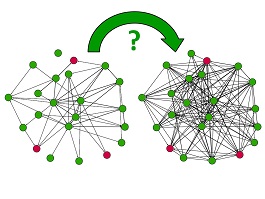Participation Support in collaboration networks of academic and scientific communities
Type of project:
Research project
Duration:
Since 2008
Involved staff members:
Description:
The project consists of two studies:
Study 1: We investigated how experienced members of student councils (as a specific form of academic communities of practice) support collaboration and integration of newcomers. We collected questionnaire data of the collaboration networks within the academic communities of practice and conducted expert interviews about participation support structures in these academic communities of practice.
In study 2, we investigate to what extent the results of the academic communities of practice can be transferred to collaboration and participation in scientific communities and how collaboration and the integration of newcomers can be supported in scientific communities. The data collection took place at the Alpine Rendez-Vous 2011 and 2013 and we implemented a quasi-experimental design to test a specific support measure (making knowledge about community members explicit). We used questionnaires to collect data about collaboration before and after the events, sociometric RFID-tags to measure interaction during the events, and analyse co-authorships as indicators for long-term scientific collaboration.
Research question:
How can we foster collaboration – especially between newcomers and experienced members – in academic communities of practice and scientific communities?
Results:
In study 1, we showed that academic communities differ from organizational teams in their use and effectiveness of participation support structures. Making community knowledge explicit supports fast integration of newcomers in the collaborative activities of academic communities of practice.
In study 2, data analysis is still ongoing. However, first results hint into the direction that also newcomers in scientific communities benefit from making community knowledge (especially about community members) explicit. This support measure seems to have positive effects on newcomers’ integration in collaborative activities in scientific communities.
Cooperation partners:
- Kristine Lund (CNRS/ Ecole Normale Supérieure de Lyon)
- Alain Barrat (CNRS/Aix Marseille Université & Institute of Scientific Interchange, Turin)
Important publications:
- Eberle, J., Stegmann, K., & Fischer, F. (2014). Legitimate Peripheral Participation in Communities of Practice - Participation Support Structures for Newcomers in Faculty Student Councils. Journal of the Learning Sciences, 23(2), 216-244. [doi:10.1080/10508406.2014.883978]
- Eberle, J., Stegmann, K., Lund, K., Barrat, A., Sailer, M., & Fischer, F. (2013). The development of collaborations in a scientific community – evidence from an experiment using sociometric RFID devices. In N. Rummel, M. Kapur, M. Nathan, & S. Puntambekar (Eds.), To See the World and a Grain of Sand: Learning across Levels of Space, Time, and Scale: CSCL 2013 Conference Proceedings Volume 1 – Full Papers & Symposia (pp. 169-175). International Society of the Learning Sciences: Madison, WI, USA.
- Eberle, J., Stegmann, K., & Fischer, F. (2012). Legitimate Peripheral Participation in Academic Communities of Practice – How Newcomers' Learning is Supported in Student Councils. In J. van Aalst, K. Thompson, M. J. Jacobson, & P. Reimann (Eds.), The Future of Learning: Proceedings of the 10th International Conference of the Learning Sciences (ICLS 2012) – Volume 2, Short Papers, Symposia, and Abstracts (pp. 386-390). International Society of the Learning Sciences: Sydney, NSW, Australia.


